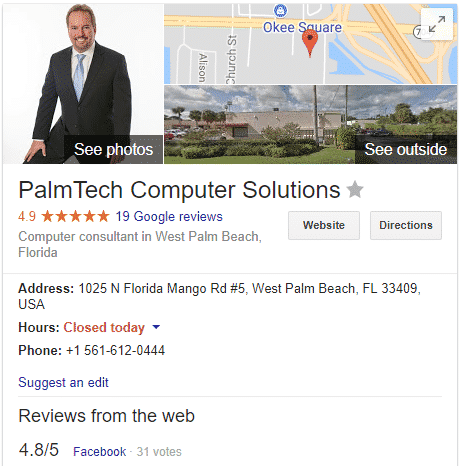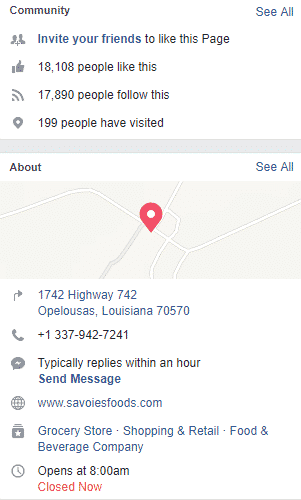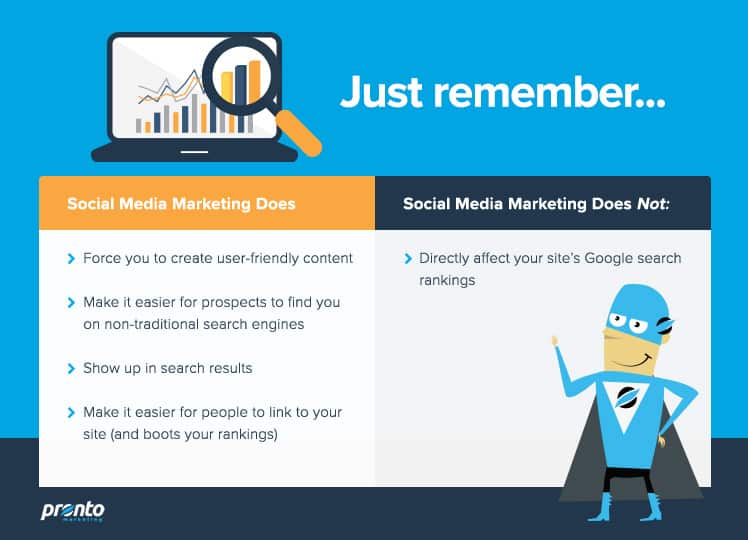Before we posted our answer, Google returned 15.8 million results for “Does social media help you rank in Google search results?”
Our Search and Advertising team poured over each result on Google’s first page, and found that none of them provided a satisfying answer for small-business owners new to search engine optimization (SEO).
From our perspective, the short answer is simple: No, Using Social Media for Business won’t boost your site’s ranking on Google.
The long answer is: Social media might affect your site’s ranking, but if so it’s too insignificant to measure.
That said, do not abandon your social media campaigns.
Let’s not forget, the entire point of SEO is getting more people to visit your website. There are countless ways to combine social media and high-quality content to increase your digital popularity.
Here are our top tips for driving more traffic to your small business website with social media:
User-friendly site content
So, we’ve hypothesized that social media posts, Likes, Shares, etc. aren’t considered when Google ranks your site. But some case studies have shown that when companies post blog articles on Facebook and receive a lot of positive feedback, those articles ranked higher in search results — why is that?
The reason that popular Facebook posts tend to rank higher on Google is because search engines have been slowly getting better at evaluating content that is user friendly.
Years ago, it was easy to improve your rankings by tricking the search engine by overusing certain keywords or getting 100 random sites to link to yours. Back then, what ranked well on Google wasn’t always valuable to real people.
Click through rates — like social media shares — are an excellent indicator that your content is actually useful.
Click through rates are measured like this: Let’s say this article makes it onto the first page of the search results for the question in our title. If Google displays our link to 10k searchers and 1k of them click on it, this article’s click through rate would be 10%.
The more search engines emphasize human input when ranking content, the more closely search rankings will be aligned with social media popularity.
Google lists social media reviews in results
Pretend you’re looking for IT support in West Palm Beach. Maybe you remember a colleague posted an interesting article from a technology provider a couple months ago, so you type the company name into Google and the results page shows this on the righthand side:

Imagine how you would react if PalmTech Computer Solutions were rated 2/5. That would probably be all it took to convince you to cross them off the list.
Thirty-one votes and a 4.8/5 rating though! That’s good enough to continue on to their site.
This is called a “branded search” because users type in the company name. Good or bad reviews don’t change the intent of the search, so Reviews from the web have only a small effect on a site’s rankings (remember, we wrote that Using Social Media for Business sometimes affects rankings, just negligibly).
You could try to game the system by recruiting friendly reviews, but remember that in addition to positive impacts on your site’s search performance, reviews also have tremendous influence over how people perceive your business. It’s always better to market yourself to humans than to search engines.
Social media platforms have their own search function
Google is not the only place people look for businesses; there are more than two billion searches on Facebook every day. Savoie’s Foods in Louisiana is a great example of how effective social media management can grab a slice of those searches as more than 1,000 people arrive on their site every month from Facebook — accounting for more than 15% of all the site’s traffic.
How is Savoie’s generating so much traffic from social media? Aside from some pay-per-click ads, they respond quickly and value user engagement.

Put yourself in the shoes of someone who made the hop from this Facebook profile page to its website. Would you have been convinced that www.savoiesfoods.com was worth visiting if the page had five likes and it “Typically replies within a week”? Probably not.
People find links on social media and share them elsewhere
Arguably the most important factor when Google ranks a website is how many sites link to it. When a high-ranking site links to your site, Google sees this as a vote of confidence and is then more likely to rank your site for it’s target keywords.
Each link to your site boosts your ranking, and there’s no better place to market valuable content than sites like Facebook, Twitter and LinkedIn.
In a perfect world, your social media marketing efforts will indirectly improve your rankings by following this process:
- Attracting a few hundred followers
- Regularly posting useful content (blog articles, white papers, event summaries, etc.)
- Followers link to your content on their own website or blog
- Those “backlinks” lead to better rankings
- More traffic to quality content results in more customer purchases
That’s called inbound marketing, and it’s the opposite of the hard sell.
Increased content value
Recently, we wrote an article about how you can dramatically increase your company’s name recognition with Google and Facebook’s retargeting ads. It usually costs less than one cent to display an advertisement on social media and if you’re targeting properly, potential customers will regularly see your business in their newsfeeds.
So what happens when one of your targeted users searches for something on Google? Will they automatically check out the first three results? Not if they see a familiar URL a bit further down.
Take Capstone IT Inc. as an example. They post several blogs every month with business-owner-friendly computer tips and tricks. But every once in a while, they write about something unrelated to technology.
In practice, it looks like this: Joe Blow sees Capstone’s content on Facebook once a week because he’s in the target audience and one day, he goes to Google and searches for “Best family camping spots in Rochester.” And this is what he sees:

Now, Joe’s interest is piqued. He thinks to himself, “Hey, they’re locals who like the same things I do.” There’s even a good chance that he picks the fourth link before any of the others. Capstone just outperformed the top three spots on Google because they spent less than a dime showing ads to Joe Blow on Facebook.
Get to posting, tweeting and pinning!
Now you see what all the fuss is about: Using Social Media for Business marketing can help you become less dependant on Google rankings. It forces you to create content that is better tailored for your audience, and if you do that, we guarantee your SEO rankings will improve.



